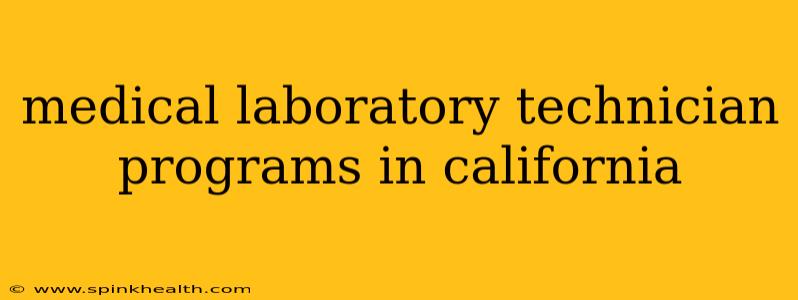Navigating the Path to Becoming a Medical Laboratory Technician in California: A Comprehensive Guide
The hum of the centrifuge, the precise pipetting, the crucial role in patient care – the life of a medical laboratory technician (MLT) is a fascinating blend of science and service. If you're drawn to this dynamic field and are looking to pursue an MLT program in California, you've come to the right place. This guide will walk you through the intricacies of finding the perfect program, understanding the requirements, and launching your career in the Golden State.
My journey into the world of medical laboratory science started with a simple fascination with the unseen – the microscopic battles waged within the human body. It ignited a passion for precision, problem-solving, and the profound impact of accurate diagnostics. This passion led me down a path that involved extensive research and a deep dive into the California MLT landscape. This guide is a product of that journey, designed to help you navigate this exciting career path with clarity and confidence.
What are the educational requirements for becoming a Medical Laboratory Technician in California?
California requires MLTs to be certified or licensed. The most common path to licensure is through completing an accredited educational program and then passing the American Society for Clinical Pathology (ASCP) Board of Certification (BOC) exam for Medical Laboratory Technicians (MLT). This means finding an accredited program is your first crucial step. These programs usually involve a combination of classroom learning and hands-on laboratory experience.
What kind of training is involved in California MLT programs?
MLT programs in California typically offer a comprehensive curriculum covering various areas of laboratory science. Expect to delve into:
- Hematology: Studying blood components and their analysis.
- Clinical Chemistry: Analyzing bodily fluids to detect metabolic disorders.
- Microbiology: Identifying and studying microorganisms like bacteria and fungi.
- Immunology: Examining the body's immune response.
- Urinalysis: Analyzing urine samples to diagnose various conditions.
- Blood Banking (Immunohematology): Working with blood transfusions and compatibility testing.
Many programs integrate theoretical knowledge with extensive practical training in well-equipped laboratories, allowing you to build the skills necessary for real-world application.
How long does it typically take to complete a Medical Laboratory Technician program in California?
The length of MLT programs can vary, but many are structured as either associate degree (AA) or certificate programs. Associate degree programs generally take around two years to complete, while certificate programs might be shorter, often focusing on a more specialized area.
Where can I find accredited Medical Laboratory Technician programs in California?
Several community colleges and universities across California offer accredited MLT programs. To ensure you're enrolling in a program that meets the state's requirements, always verify its accreditation with the California Department of Public Health or the accrediting agency itself (such as the National Accrediting Agency for Clinical Laboratory Sciences (NAACLS)). A simple online search for "NAACLS accredited MLT programs California" will provide a great starting point.
What is the job outlook for Medical Laboratory Technicians in California?
The demand for skilled medical laboratory technicians is consistently strong in California and across the nation. The aging population and advancements in medical technology contribute to this growing need. With a recognized certification and a passion for the work, you'll be well-positioned for a rewarding and stable career.
What are the licensing and certification requirements after completing my program?
After successfully completing your accredited MLT program, you'll need to pass the ASCP BOC exam for MLTs to become certified. This certification is often a prerequisite for licensure in California. Check with the California Department of Public Health for the most up-to-date and specific licensure requirements.
Starting Your Journey:
The path to becoming a medical laboratory technician in California is both challenging and incredibly rewarding. Thorough research, careful program selection, and dedication to your studies are key to success. Remember to focus not only on acquiring the technical skills but also on fostering a genuine passion for contributing to patient care through the critical work of laboratory diagnostics. Your journey starts with a single step – exploring accredited programs in your area. Good luck!

